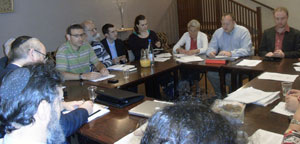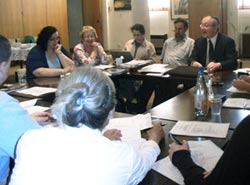The 2011 Annual General Meeting of SCoJeC was hosted by the Edinburgh Hebrew Congregation, which also kindly provided lunch in the Community Centre.
The meeting began with a presentation by the guest speaker Jeremy Newmark, Chief Executive of the Jewish Leadership Council (JLC). He explained that their remit is "to strengthen the major institutions of British Jewry, to promote cooperation between them, and to help the leadership of our community articulate a confident and compelling narrative of mainstream Jewish life in the United Kingdom". He praised the cooperation that exists with SCoJeC, who provide parliamentary monitoring services to a consortium of UK communal organisations through the JLC's network, and discussed a number of other ways in which collaboration could be developed.
 |
SCoJeC Director, Ephraim Borowski, responded by explaining that the Council was first established during the run-up to Devolution, when it was generally accepted that some 90% of day-to-day life in Scotland would come under the control of the Scottish Parliament and Government (then called the Scottish Executive). The intention was that we stand in the same relationship to them, and to Scottish churches and other faiths, the Scottish media, Scottish Trades Unions, and other organs of Scottish civic society, as the Board of Deputies does at the UK level. Just that week, the Senior Vice-President of the Board had commented that "SCoJeC does a prodigious amount of work with very limited resources" - and we have been phenomenally successful, achieving significant legislative change, speaking out for the Community, influencing public opinion, reaching out to those who have no physical connection with the Community, and holding exciting and innovative events in parts of Scotland that no other Jewish organisation has ever reached. In a week when the Jewish Chronicle had headlined the President of the Board of Deputies saying that the Board has "access but no influence", he said that, although influence does not always mean complete success, SCoJeC could justifiably claim to have both access and influence.
Another issue that concerns the JLC is how to respond to antisemitism. Most topical for Scotland was the question of what attitude to take to the West Dunbartonshire Council motion to boycott Israeli products. Arguably a stand must be made against the Council's decision, but on the other hand it could be argued that the boycott was being given needless media publicity, when in fact it dated back to 2009, had never been implemented, attracted no support, and had led to some ridicule in the blogosphere.
 |
Of more concern was the decision by the recent Congress of the University and College Union (UCU) to repudiate the definition of antisemitism proposed by the European Monitoring Centre on Racism and Xenophobia (EUMC), on the grounds that the EUMC regards certain kinds of criticism of Israel, such as using traditional antisemitic stereotypes, as antisemitic. According to the principle formulated in the Macpherson Inquiry into the murder of Stephen Lawrence, "a racist incident is any incident which is perceived to be racist by the victim or any other person". The consensus in the Jewish community is that since the UCU resolution seeks to disapply this to only one kind of racism - antisemitism - it is itself antisemitic. The UCU decision is particularly pernicious, as it could discourage academics from offering support to students when they are attacked. Laura Jahnke, speaking on behalf of the Edinburgh Jewish Students Society, and the Northern Region University Chaplain, Rabbi Garry Wayland, strongly supported this position, having directly experienced Middle-East related antisemitism on campus and elsewhere. The meeting agreed that any public policies or actions that make Jews feel less safe and more fearful to identify as Jews should be regarded as antisemitic, and that a stand has to be made in order to protect the Jewish community from this sort of politics.
The meeting then moved on to discuss SCoJeC's own work. The Chair, Paul Spicker, summarised some of the key areas of work, and drew attention to governance issues that had been addressed. The Hon Treasurer, Neil Livingstone, reported that the Council's finances are healthy, although this is mainly thanks to Scottish Government grants that cannot be relied on to be renewed for the future, and it was noted with regret that the Board of Deputies had not supported the Council since 2009 despite their public recognition of the work we do. The meeting also agreed to apply for incorporation as a Scottish Charitable Incorporated Organisation (SCIO), and approved a draft constitution that meets the regulatory requirements to take effect subject to any technical adjustments required by the Charity Regulator (OSCR).
The principal report before the AGM dealt with SCoJeC's representative and outreach work on behalf of the community. Ephraim began by describing the previous ten days as a microcosm of our year. SCoJeC's Deputy Director, Leah Granat, produces daily digests of relevant matters in the Scottish media and from Scottish, UK, and EU Parliaments and Governments and NGOs, and a weekly digest of all matters of interest to ethnic minority communities, as well as being the front office, receptionist, archivist, researcher, and many other tasks. She and Ephraim had met the deputy head of the Community Safety Unit to discuss the CSU's proposal for a joint project. They asked for and held an urgent meeting with the Cabinet Secretary for Education about the problems Jewish students face on campus. Meanwhile Ephraim chaired the Board of Bemis for the first time, attended the Board of Deputies Defence Division and Plenary, and chaired the Board's Regional Assembly, and Leah attended the Executive of the Scottish Inter-Faith Council. SCoJeC received numerous requests for information as a result of the international campaign to boycott "Dumbartonshire whiskey", and had tried to inject a sense of proportion and strategy. At the same time, the summer issue of Four Corners had to be prepared and edited. They were invited at short notice to a private meeting with the Community Safety Minister to discuss the Offensive Behaviour at Football and Threatening Communications (Scotland) Bill before she presented it to Parliament, and Leah prepared a draft response for Council to approve for submission to the Parliamentary Justice Committee which had given less than a week for consultation. Even when on "holiday" for a week, Ephraim had meetings about the proposed communal genealogy project and interfaith lecture tour. Back home, Leah spent a good part of three days negotiating with pathologists, Procurator Fiscal, the French consulate, and the bereaved family to make arrangements for the body of a French doctor who died suddenly in Glasgow to be repatriated without a post mortem.
Ephraim concluded that firefighting is inevitable in SCoJeC's work, but, as a consequence of our lack of adequate resources, in particular staff, the level of firefighting can sometimes overwhelm other activities. He therefore urged the Executive and Council to address this in the coming year.
The Council also approved two new cooptions: Edgar Prais QC, who has recently retired after a career as one of the most high profile members of the Scottish criminal bar; and Paul Morron, has been chair of both Northern and national student Chaplaincy Boards, has experience of both senior civil service and the voluntary sector, is a member of the Board of Jewish Care Scotland, and is leading the Glasgow Jewish Representative Council Community Futures Project. Prof Sir Gerald Gordon, who stepped down after several years as a cooptee, will continue to advise on legal matters as a member of the Council's advisory panel.